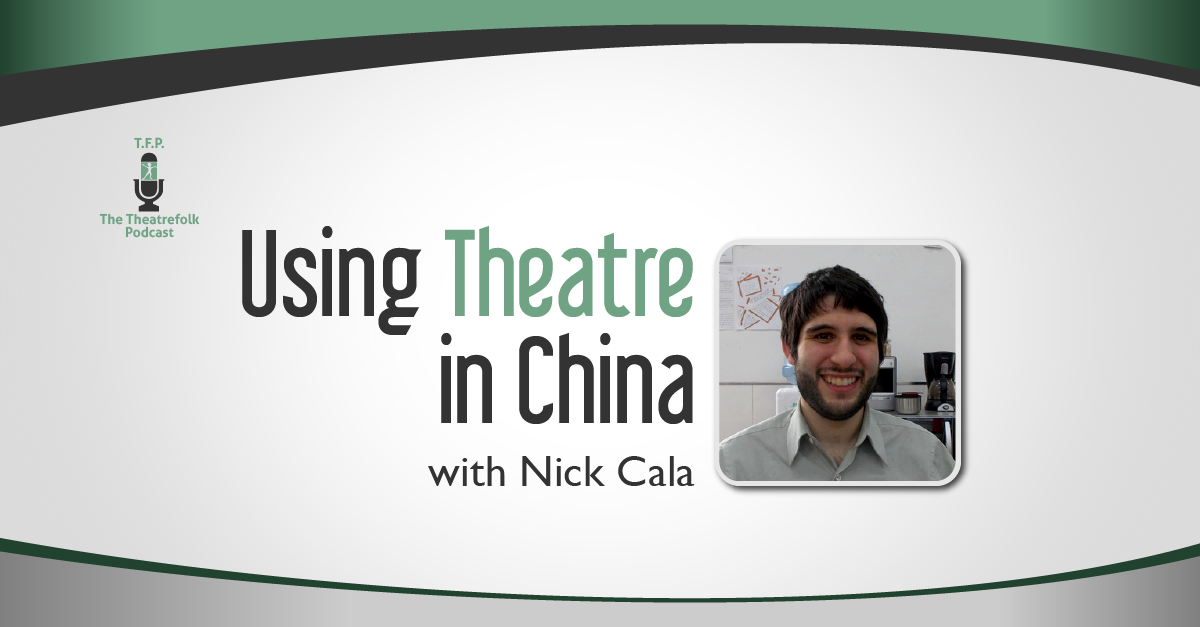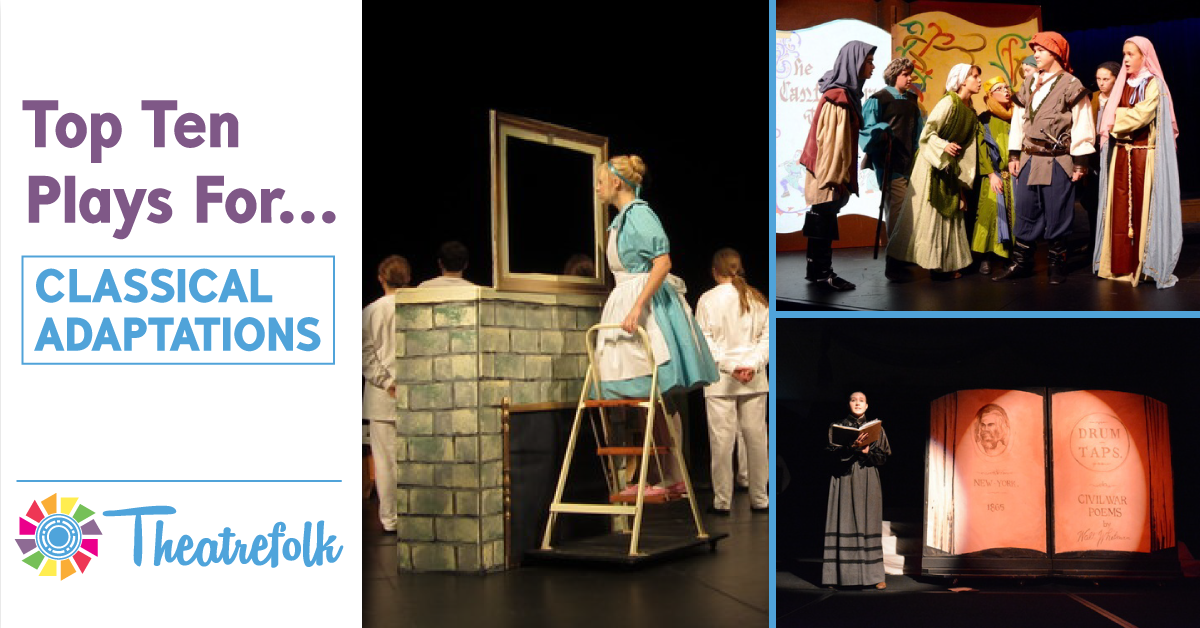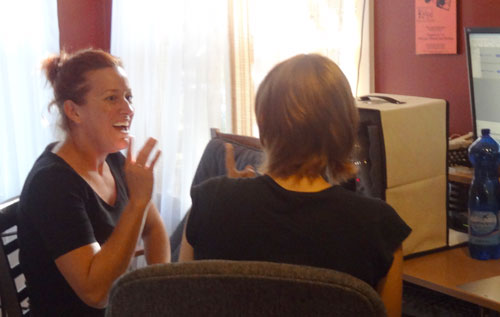Using Theatre in China
Episode 124: Using Theatre in China
Nick Cala is a high school teacher in China. He’s putting up a play for the first time with Chinese students who are studying to attend American universities and fully believes in the importance of drama as part of their process.
Show Notes
- Alice
- Drum Taps
- Shuddersome: Tales of Poe
- Hamlette
- Drop Dead Juliet
- Other ‘Classical Adaptations’ at Theatrefolk
Episode Transcript
Welcome to TFP – The Theatrefolk Podcast – the place to be for Drama teachers, Drama students, and theatre educators everywhere.
I’m Lindsay Price, resident playwright for Theatrefolk.
Hello! I hope you’re well. Thanks for listening.
Welcome to Episode 124!
You can find any links for this episode at the show notes at theatrefolk.com/124.
All righty! So, today, I am talking to a high school teacher in China, Nick Cala. He is in China right now and he is putting up a play for the first time – not at an international school but with Chinese students who are studying to attend American universities – and it just so happens that this first play that he’s doing this with is one of ours. He’s putting up my adaptation of Alice in Wonderland. When I heard this, I was like, “I have to talk to this guy!”
Nick really believes in the importance of drama as part of creating that well-rounded student. How does that translate in another country? In another language? Especially in a school where students are very focused, as you’ll hear, on academics.
Let’s get to it!
LINDSAY: All right. Hello everybody! I am sitting here with Nick Cala. Hello, Nick!
NICK: Hello!
LINDSAY: Hello! Now, we have the wonders of technology working for us again right now because I am sitting here in my house in the early a.m. in North America. Nick, tell everybody where you are.
NICK: I’m in Jiangsu, China – very close to Shanghai – and it’s in the evening here.
LINDSAY: You’ve had your day already.
NICK: Yes! It’s almost Thursday here.
LINDSAY: It’s amazing to me that, well, not only that we’re able to do this but that we found you because you’re doing some Theatrefolk plays. You’re doing Alice, is that right?
NICK: Yes! We had auditions and now we’re beginning the process of giving the students the script and kind of getting the students to get a sense of their characters.
LINDSAY: And are you at an international school? Are you at a Chinese school? Like, who are your students?
NICK: My students are Chinese kids who are planning to go to university in America. This is a kind of private center in a Chinese school built around preparing students to go to university in America.
LINDSAY: Wow. That’s very specific, isn’t it?
NICK: Yeah, it’s a little different than an international school, and it makes for some unique challenges. I mean, the kids are all coming at things with a very different perspective than American kids.
LINDSAY: Yeah, okay. We’re going to get into that in a second. I just wanted to ask you, how did you end up in China?
NICK: Well, the story is this was actually my first teaching job. This is my third year in China and I had taken Chinese in college but it was more or less not because of any intensive interest. It was more because I wanted to try something slightly different. As I took it, I got more and more into it. But, at the same time, I was taking courses in US History and I didn’t really expect that they would come together – US History teaching and knowing some Chinese. When I saw the job available, I got very excited and I got lucky enough that it worked out.
LINDSAY: Just me being ignorant here – do you have to teach in Chinese or do you teach in English?
NICK: Oh, I teach in English. I don’t think I could teach in Chinese. My Chinese is not that good.
LINDSAY: Okay. And then, here’s the twist. You teach history but you are in-charge of the drama club at your school.
NICK: Right.
LINDSAY: How did that happen?
NICK: I started out, I was not in-charge of the drama club. I was kind of second in command to another teacher, Steven Fulton, who has taught drama for a long time and who I worked with the past two years as kind of his co-director. I worked under him and I learned a lot from his experience and I personally saw, in the last couple of years, the great effects that drama could have for our students and the cool experiences they could gain from it. They sort of learn so much English from it and I really enjoyed it and I’m excited. This year, this is actually my first year as the sole head of the drama club and I’m looking forward to getting into the directing and really kind of shaping the performance this year.
LINDSAY: Do you have a background in drama or is this just something that you got landed into?
NICK: Well, the major background that I have, I’ve been a member of a drama club before, but this is my first time being the head of it so the two years’ experience I had working under Steve – Steve Fulton – really has helped prepare me and I hope will help.
LINDSAY: You’ll see how it goes.
NICK: Yeah.
LINDSAY: Did you do it in high school yourself?
NICK: I did, yeah.
LINDSAY: Cool. So, you know sort of the influence that theatre can have on high school because that’s sort of where you started.
NICK: Definitely. I mean, I wasn’t taking the lead role. But, at the same time, being in drama club kind of makes you realize that you don’t need to take the lead role. You can be part of a larger cast and it can really have positive effects on both your education and also just on your social life and your ability to kind of put yourself out there..
LINDSAY: Well, it’s kind of like it’s a community, isn’t it?
NICK: Yeah, absolutely.
LINDSAY: All right. Now, let’s get into what you just talked about – the positive effects – the effects that drama can have on your students in particular. It just must be fascinating to see them interact in this extracurricular activity in a second language for them. So, what are you seeing when you’ve been watching these students take on drama?
NICK: Chinese students, I remember when I first arrived in China and I talked to people, often, people make generalizations about Chinese students that they’re less creative in some way or that they lack certain things that Western educated kids have and, for me, seeing the students take part in drama sort of disproves all those misconceptions and generalizations. In many ways, seeing them doing things like kind of figuring things out, creating small plays on their own, building scenes, kind of giving them the chance to express themselves, I mean, you begin to see that, given the opportunity and the chance to work together to collaborate, to be creative, they have all the same abilities and they have the same thoughts. It really kind of opens you up to the potential of the kids and shows you a different side than you wouldn’t necessarily get in the classroom.
LINDSAY: Well, I mean, when they go out, because, if their goal here is to go to an American university, academics is really only one part of that experience, isn’t it?
NICK: Yeah, academics is definitely a big part of that.
LINDSAY: Oh, yeah.
NICK: But, oftentimes, the problem is that our program is sort of built around AP – advanced placement – sort of the exam-based approach. So, they get academics eight periods a day and they get constant exam pressure, almost all the time, and they have to take Chinese exams as well. So, there’s a degree to which they almost overload on academics. They have roughly ten hours of classes every single day. So, having a relaxed environment where they can speak English, where they can kind of interact in ways that are not just around things that they’re forced to do is so important.
LINDSAY: Is your administration supportive of the drama club?
NICK: Yes, absolutely. We have kind of two sides to administration. One is the English side which is very happy and very excited to have extracurricular activities. Any time that I require some space, the stage, they work with me on reserving it and kind of work with me on picking dates, figuring things out with students, making sure that I have the resources that I need. On the Chinese side, there is a little bit of tension because there’s always this feeling that we need to focus on academics. But, in our school’s case, I’m very happy to say that we have a very good partnership where the school kind of has grown and continues to understand that academics and extracurricular activities are supportive of each other rather than in competition.
LINDSAY: Because, I mean, that’s something that happens – I mean, it’s happening everywhere. This is what’s happening in schools, and certainly in the States, where the academic is just sort of pushing every other aspect out. The arts are just going. Just to hear you talk about how important that partnership is between academics and a place where they can express themselves, you know, I wish that everybody had that ability to see the benefits.
NICK: Yeah, and I think it’s really important. I know, in the States, there are all those debates over the budget and over whether or not we can include these programs. I mean, the thing is, in the end, I don’t think my students are likely to all go on to become actors or dramatists, but there’s so much value in this beyond just where you stand on the stage when it says “stage left” or how to say the lines. There’s the emotion behind the words, there’s the creative ability to think in different ways, there’s just the ability to have fun in English and to think differently in a second language. I think that we lose out on a lot when we forget the sort of secondary gains that we make when we teach drama.
LINDSAY: Ugh! Absolutely! Absolutely! Well, it is! It’s got nothing to do with creating actors. It has to do with can this human being actually maybe talk to another human being and express themselves and have a little confidence. Ah, okay!
NICK: Absolutely.
LINDSAY: So, you’re diving into directing a play. What was the audition process like with these students?
NICK: It was kind of a daunting process for me but I think it was probably more daunting for the students. But it was really great to see the excitement. Many of the students had seen the movies of Alice in Wonderland and they were excited to kind of take on the roles of the characters that they liked and it was great to see them very willing to put themselves out there, especially because, in an audition, you have the chance of being rejected. I think it’s a scary thing in a first language; it’s a scarier thing in a second language. So, I really applaud the students for being willing to go up there and to know that, some of them, their names wouldn’t be on the list for having made it and having gotten the part. So, in some ways, it was maybe daunting for me because I was having to decide between them and, you know, I think that there’s so much talent in our student body where I probably could have chosen several people for the same role. But it was probably even more daunting for them.
LINDSAY: Why did you pick Alice in Wonderland? Why did you pick Alice as the play that you were going to direct?
NICK: There’s a few reasons that I was looking at it and I was thinking about it. Part of it is that there’s immediate interest. Many of the students have seen the Tim Burton movie recently and they really enjoyed that and they really liked the rich characters and that part of it so that played into it a little bit. But, also, I think there’s a lot of very rich connections that you can make. I’ve talked about it with the math teacher and they were telling me about all the rich connections with math and Lewis Carroll’s kind of personal…
LINDSAY: Oh, please, tell me one rich connection with math! I want to hear one! Please!
NICK: I’m with you there but I think that it’s certainly one area where it can support that as well. Also, just the fact that there’s sort of this colorfulness and this excitement, there’s a fantasy to it, and I think a lot of the students are already familiar with it whereas many of the plays that are out there are more difficult for our students in particular because, well, they maybe haven’t been exposed to some of the particulars of it and they are already familiar with Alice in Wonderland as kind of this fairy-tale world and I think it’s something that they can get excited about.
LINDSAY: When you’re seeing them in a dramatic context, what do you think is the most difficult thing that Chinese students have in terms of expressing themselves on-stage?
NICK: Well, let’s see. I think probably the hardest part is putting themselves out there and really taking bolder steps in their acting, in part because, in a Chinese school, for the most part, many of their classes, they are one in sixty and there’s a lot of attention being paid to not standing out and drama is about kind of removing those inhibitions, removing the kind of I guess the word would be stigma on being different, and I think the challenge sometimes is just getting them to kind of go in 100 percent with their character, to take things, to do something that might seem stupid or seem like it will be ridiculous, and once you can build that trust where they can do something on-stage that maybe their fellow actors, they might think they might get laughed at for, or they might think that they’ll stand out a little bit for, getting them past that is the toughest step and it’s the one that takes the longest. But, once you do, I think it kind of promotes everybody to take that step also. So, the first time that you do that is the most difficult.
LINDSAY: And how are you going to help them do that?
NICK: Well, the biggest thing is making sure that the group is respectful of each other and making sure that, you know, if someone does something and, again, takes that step where they’re putting themselves out there, they’re doing something that’s different, as the drama club head, I try to point that out as something positive, as, well, you know, “This was really good in some way because they took this risk,” and, for the most part, I find that the risk that people take, even if it doesn’t work in some way, there’s always something positive that comes out of that risk, there’s always something where I can pull on it and say, “Well, maybe we could tweak it and do it slightly differently, but the fact that you – maybe – moved your hand in this certain way or you made that facial expression the way that you did, we can change that up and make it fit,” and, usually I find that it’s very possible to take that risk and turn it into something productive even if it doesn’t seem it on its face.
LINDSAY: I imagine, you know, I would go with the stereotype and say that because these students are working so hard that they would take the whole notion of doing something wrong very poorly. But then, I go, “You know what? All students are like that. It doesn’t matter where they are.” When someone says to them, “Oh, that wasn’t quite right, try it again,” it’s a hard thing for them to overcome, isn’t it?
NICK: Yeah, absolutely. I think every middle school and high school student in the world, there’s a degree to which you want to fit in and you want to kind of make sure that you’re not pointed out as in some way different. Drama is about kind of beating that and saying, “This is who I am and I’m willing to take the leap,” I guess.
LINDSAY: Very good. I love that. Okay. So, you’re a new director?
NICK: Yes.
LINDSAY: Actually, we have a lot of listeners who are in the same boat. So, just talk about how are you approaching this experience? How are you preparing? Are you diving in? You know, you and your students are in the same boat? How are you approaching this new venture?
NICK: Well, I mean, you know, trying to learn every day. I think I’m probably as much – if not more – a student than my students. But I think the key thing that I try and take away from each drama club meeting is that I really want to collaborate with the students. I want them to feel like this is their production as much as it is mine because I think, in the end, more than the final product, it’s about students making the play their own and figuring it out together with me. So, I’m kind of approaching it in the sense that this isn’t my play; this is their play that I am facilitating. With that said, I am sure that I’ll probably be able to give you a better answer as time goes on.
LINDSAY: That’s right, eh? “My answer is I don’t know yet.” But that’s okay!
NICK: Exactly!
LINDSAY: Well, I have to say though that I think that approach is very reflective of a drama and education approach – that process is the name of the name and however you get through to the end product, it’s the process which is the important part for your students.
NICK: Yeah. I mean, I want the students to come away making something that they can be proud of but, in the end, if that isn’t something that would open on Broadway, that doesn’t matter as much then that they are getting a lot out of this experience, that they had a good time, that they learned some skills that allowed them to succeed in campus life. But, with that said, I’m confident – given the skills that I’ve seen and strong auditions that I saw – that I think they’re going to do something special.
LINDSAY: Well, you know, for some people, just the act of getting on a stage and opening their mouth is a success and I’m always amazed. I’m always amazed at how wonderful those experiences are for students. It’s the reason I write for youth and for schools and student performers because going to see a school play and hearing about someone who’s on-stage and who cares, maybe they’re ready for Broadway, maybe they’re not? But the process that they’ve had and the end result, more often than not, it’s a wonder. So, I think it’s great, Nick. I think it’s wonderful that you’re taking on this experience and I hope that you’ll let me know how the show goes and that you let me know at the end of your process if it went well.
NICK: I definitely will.
LINDSAY: Perfect!
NICK: I’m really excited and I think that the students will really gain a lot from Alice and from taking part in the – exactly as you said – the process of creating the play.
LINDSAY: Awesome. Thank you so much for talking to me and have a good night!
NICK: Thank you for inviting me! Have a good morning!
Thank you, Nick!
So, before we go, let’s do some THEATREFOLK NEWS.
It’s a play feature! It’s a play feature! It’s time to feature a play! Actually, not actually a play but actually a whole category of plays! Jazz hands!
Okay. So, adaptation, that’s my thang. It is my absolutely favorite type of play to write, it’s my absolutely favorite type of thing to do, and it’s because it’s kind of like a jigsaw puzzle. You have to figure out taking a work that was written for a specific genre and, you know, playing the “what if” game with it. You know, what if this poem became a play? What if this novel became a theatrical experience? How does it work when you move genres, you know? Because you just can’t take a round peg and put it into a square hole. It doesn’t fit. But how do you maintain the integrity of the original and yet maintain the integrity of the new form? It’s fascinating, I know – maybe not to everybody but that’s the thing I like to do.
So, we have quite a number of adaptations and I think that, if you are looking for material that maybe is a little more curriculum-driven, if you’re looking maybe for a cross-curricular element, adaptations, they’re a first stop, right?
The majority of our adaptations are classical adaptations. So, the likelihood that they’re being studied in your English class is high – very high. For example, we have theatrical adaptations of Alice in Wonderland, Through the Looking Glass. Walt Whitman’s Drum Taps Poetry which was a big bear but a very, very satisfying bear to sort of figure out how to make this character-driven. Same with Poe; we have a play called Shuddersome which takes on the short stories and poems of Edgar Allan Poe, that one was very fascinating because it seems very character-driven but it’s actually a reader imagination-driven experience that he was really going for; he really wanted to create the horror in the mind and what happens when we sort of put that on-stage.
Not only that, we have a number of parodies, and I think parodies are a really great doorway for something like Shakespeare. Allison Williams has a number of them with us – Hamlette, Drop Dead Juliet.
What they do is they take the original text as a base and exaggerate it and it makes for not only a great doorway perhaps with middle school students and you sort of want to introduce them to this world but also as an analysis exercise. Use the original Romeo and Juliet and compare and contrast it with Drop Dead Juliet. How does a scene from one compare and contrast to the derivative version, right? Lots of stuff here! Lots of opportunities to take theatre into the curriculum to make it matter to maybe your administrators as much as it matters to you as it always has mattered to you, right?
Okay. So, go to theatrefolk.com, check out the category, “Classical Adaptations.”
Finally, where, oh, where can you find this podcast? We post new episodes every second Tuesday at theatrefolk.com and on our Facebook page and Twitter. You can find us on YouTube.com/Theatrefolk and you can find us on the Stitcher app. You can also subscribe to TFP on iTunes. All you have to do is search on the word “Theatrefolk.”
I’m very excited over adaptations there. What does that say about me? Well, I don’t know!
And that’s where we’re going to end. Take care, my friends. Take care.
Music credit:”Ave” by Alex (feat. Morusque) is licensed under a Creative Commons license.



